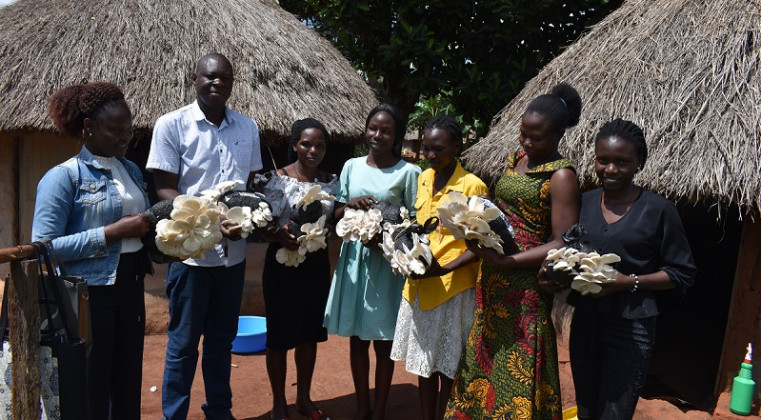GULU, UGANDA: Gulu University has trained over 50 students on how to grow cost-effective oyster mushrooms using low-cost technology applicable everywhere in the villages or rural Uganda as the mushroom can be made to grow even in the grass-thatch hut, the training has demonstrated.
This is made possible through a partnership between Gulu University and AVSI foundation under a project called ‘Skilling Agriprenuership for Increased Youth Employment (SAY) with funding from the Embassy of Netherlands focusing on developing the competence of Young people between the age of 13 to 30 to increase income opportunities in the agri-business sector.
The mushroom production training is one of the many other commitments of Gulu University under the partnership to train over 200 youths with hands-on skills in horticulture production and management, agro-processing, bee-keeping, business and entrepreneurship, life and soft skills among others.
Atimango Brenda one of the beneficiaries of the low mushroom production training said she would use the skill to earn money because it is easy to manage the production process.
Akello Josephine one of the co-facilitators of the training said the students were very active and interested in the training which motivated them in learning more.
Otim Fred the led trainer from the department of Agronomy, Faculty of Agriculture and Environment said they used a grass thatched hut as an incubation room for the mushroom so that the student would be able to appreciate and find it easy to do with a clear demonstration of cost-effectiveness not just in theory but in real practice.
“This is meant for rural settings and within a month mushroom would be ready to be taken to the market and we are pleased that this project accepts students from all the faculties provided they are interested in hands-on skilling training initiative”. Otim submitted.
Dr. Okello Collins the Dean Faculty of Agriculture and Environment said that the university is using the ‘earn as you learn skilling model’ where the youth involved in the training would begin enjoying the fruit of the training immediately.
“So every study group who finishes with an end product would be involved in selling their products and marketing it so that they get all the experiences of the value chain in their various projects initiatives”. Dr. Okello said.
The training is designed in phase manners between one to two months where youth who started a month ago is set to graduate with their products before another group is taken.
The SAY project has a target of training over 16,000 youth aged 18-30 years for immediate employment in the agricultural sector.
If you would like your article/opinion to be published on Uganda’s most authoritative news platform, send your submission on: [email protected]. You can also follow DailyExpress on WhatsApp and on Twitter (X) for realtime updates.



